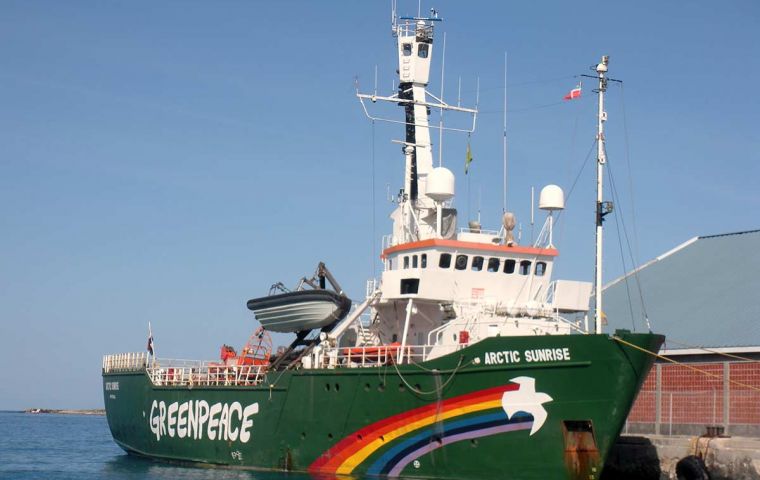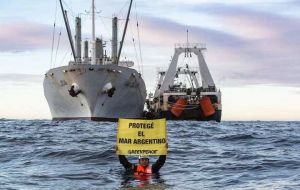MercoPress. South Atlantic News Agency
Greenpeace ship moors in Buenos Aires
 Greenpeace's Arctic Sunrise just completed a survey on the environmental consequences of uncontrolled fishing in the South Atlantic
Greenpeace's Arctic Sunrise just completed a survey on the environmental consequences of uncontrolled fishing in the South Atlantic Greenpeace's Arctic Sunrise will be open to the public Sunday after mooring Thursday in the port of Buenos Aires. The vessel from the environmental organization returned to land from a mission to survey fishing exploitation in Atlantic Ocean international waters near the Argentine Sea.
This activity produces various “effects on marine ecosystems that do not allow their recovery”, Luisina Vueso, coordinator of the oceans campaign of this NGO, told Télam.
The campaign, which began in Ushuaia on March 12, allowed the ship to enter the area known as the Blue Hole, 500 kilometers from the Gulf of San Jorge, to observe the state of the marine ecosystem.
Argentina's Ministry of Science explained that “the Blue Hole is a region of high primary productivity: ”It is a feeding area for several species of great economic importance (such as hake, Patagonian scallop, and squid) and for many birds and mammals.“
”Due to the abundance of biological resources, the sector adjacent to the Exclusive Economic Zone registers an intense foreign fishing activity focused on the capture of squid. The impact of fishing on biodiversity and food chains is largely unknown, so it is urgent to obtain reliable information to promote the sustainable management of fishing grounds and establish actions to protect the affected species,“ the Ministry also pointed out.
Vueso said that her NGO's expedition was able to ”verify the damage being done by the predation of fishing boats in the vulnerable ecosystems at depth“, and that in this area around 500 boats fished ”400 kilometers off the Argentine coast.“
Greenpeace was also able to detect ships carrying out ”transshipments of merchandise and ships with records of illegal activities“, which use the method of trawling with nets to capture fish and invertebrates on the seabed, thus ”sweeping away“ the ecosystem.
Although most fishing vessels in this area come from China, Taiwan, South Korea, and Spain, ”they also operate under flags of convenience through companies that buy flags from other countries to do what they want,“ Vueso also explained.
The Greenpeace coordinator also pointed out that the trespassers operated other vessels in the area, which provide services such as refrigeration for ed boats that make open sea transshipments. ”The fishing vessel passes on the catch and continues fishing until its hold is full ... [and] control is lost over what, where and how the fish is caught and the impact on the ecosystem,“ Vueso detailed.
As for marine ecosystems, she pointed out that although ”we see them as something distant and dark because of the depth,“ in reality these areas are ”full of life and sustain the entire ecosystem“. The ocean depends on these ecosystems ”to generate the services it provides to the planet“ such as oxygen generation, carbon capture, and climate and water regulation.
Vueso also explained sanctions applied to ships operating are far from being ”a solution,“ but neither is patrolling, due to the ”large dimensions“ of the sea, Vueso admitted.
”We are demanding the signing of a global treaty for the oceans to save this lack of governance and to have the tools to protect this area, which has no international regulation,” she concluded. (Source: Télam)





Top Comments
Disclaimer & comment rulesCommenting for this story is now closed.
If you have a Facebook account, become a fan and comment on our Facebook Page!